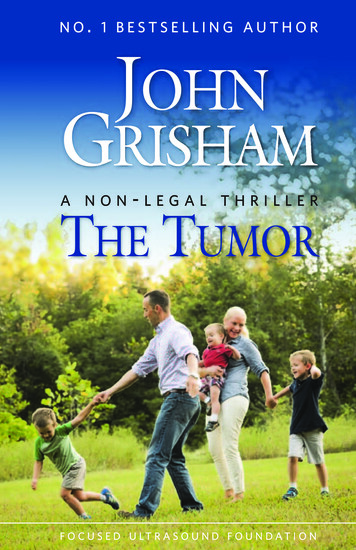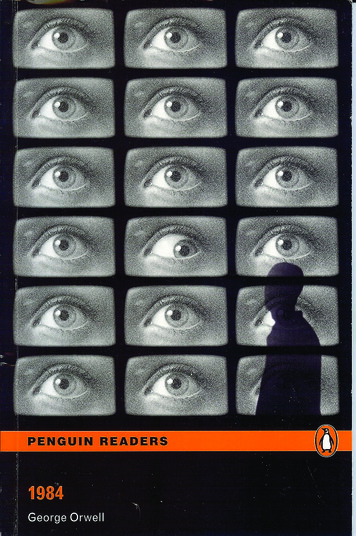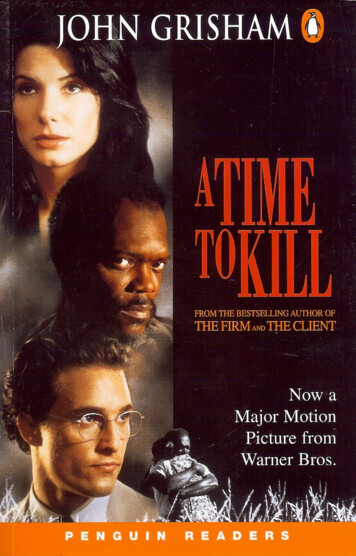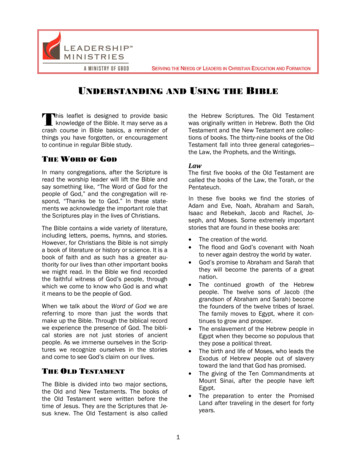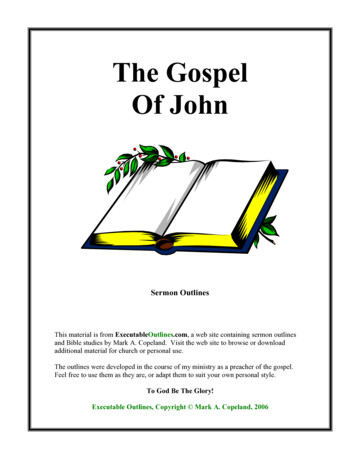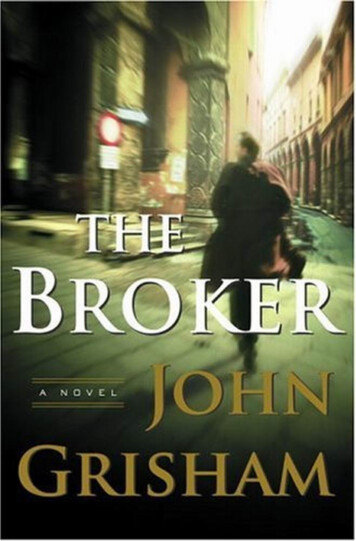
Transcription
John GrishamThe BrokerThe BrokerJohn Grisham-1-
John GrishamThe BrokerA Time to KillThe Firm The Pelican BriefThe ClientThe ChamberThe RainmakerThe Runaway JuryThe PartnerThe Street LawyerThe TestamentThe BrethrenA Painted HouseSkipping ChristmasThe Summons The King of TortsBleachers The Last Juror-2-
John GrishamThe BrokerJohnGrisham-3-
John GrishamThe BrokerDoubledayNew York London Toronto Sydney Auckland-4-
John GrishamThe BrokerPUBLISHED BY DOUBLED4.Ya division of Random House IncDoublfday and the portray al of an anchor with a dolphin are registeredtrademarks of Random House, IncISBN 0 385 51045 4Copyright 2005 b Belfry Holdings, IncAll Rights ReservedPRINTED IN THF UNITED STATES OF AM*RIC*-5-
John GrishamThe Broker-6-
John GrishamThe Broker-7-
John GrishamThe BrokerIn the waning hours of a presidency that was destined toarouse less interest from historians than any since perhaps that of WilliamHenry Harrison (thirty-one days from inauguration to death), Arthur Morganhuddled in the Oval Office with his last remaining friend and pondered hisfinal decisions. At that moment he felt as though he'd botched every decisionin the previous four years, and he was not overly confident that he could,somehow, so late in the game, get things right. His friend wasn't so sureeither, though, as always, he said little and whatever he did say was what thePresident wanted to hear.They were about pardons-desperate pleas from thieves and embezzlers andliars, some still in jail and some who'd never served time but whononetheless wanted their good names cleared and their beloved rightsrestored. All claimed to be friends, or friends of friends, or die-hardsupporters, though only a few had ever gotten the chance to proclaim theirsupport before that eleventh hour. How sad that after four tumultuous yearsof leading the free world it would all fizzle into one miserable pile ofrequests from a bunch of crooks. Which thieves should be allowed to stealagain? That was the momentous question facing the President as the hourscrept by.-8-
John GrishamThe BrokerThe last friend was Critz, an old fraternity pal from their days at Cornellwhen Morgan ran the student government while Critz stuffed the ballotboxes. In the past four years, Critz had served as press secretary, chief ofstaff, national security advisor, and even secretary of state, though thatappointment lasted for only three months and was hastily rescinded whenCritz's unique style of diplomacy nearly ignited World War III. Critz's lastappointment had taken place the previous October, in the final frantic weeksof the reelection onslaught. With the polls showing President Morgantrailing badly in at least forty states, Critz seized control of the campaign andmanaged to alienate the rest of the country, except, arguably, Alaska.It had been a historic election; never before had an incumbent presidentreceived so few electoral votes. Three to be exact, all from Alaska, the onlystate Morgan had not visited, at Critz's advice. Five hundred and thirty-fivefor the challenger, three for President Morgan. The word "landslide" did noteven begin to capture the enormity of the shellacking.Once the votes were counted, the challenger, following bad advice, decidedto contest the results in Alaska. Why not go for all 538 electoral votes? hereasoned. Never again would a candidate for the presidency have theopportunity to completely whitewash his opponent, to throw the mother ofall shutouts. For six weeks the President suffered even more while lawsuitsraged in Alaska. When the supreme court there eventually awarded him thestate's three electoral votes, he and Critz had a very quiet bottle ofchampagne.President Morgan had become enamored of Alaska, even though thecertified results gave him a scant seventeen-vote margin.He should have avoided more states.He even lost Delaware, his home, where the once-enlightened electorate hadallowed him to serve eight wonderful years as governor. Just as he had neverfound the time to visit Alaska, his opponent had totally ignored Delaware-noorganization to speak of, no television ads, not a single campaign stop. Andhis opponent still took 52 percent of the vote!Critz sat in a thick leather chair and held a notepad with a list of a hundredthings that needed to be done immediately. He watched his President moveslowly from one window to the next, peering into the darkness, dreaming ofwhat might have been. The man was depressed-9-
John GrishamThe Brokerand humiliated. At fifty-eight his life was over, his career a wreck, hismarriage crumbling. Mrs. Morgan had already moved back to Wilmingtonand was openly laughing at the idea of living in a cabin in Alaska. Critz hadsecret doubts about his friend his ability to hunt and fish for the rest of hislife, but the prospect of living two thousand miles from Mrs. Morgan wasvery appealing. They might have carried Nebraska if the rather blue-bloodedFirst Lady had not referred to the football team as the "Sooners."The Nebraska Sooners!Overnight, Morgan fell so far in the polls in both Nebraska and Oklahomathat he never recovered.And in Texas she took a bite of prizewinning chili and began vomiting. Asshe was rushed to the hospital a microphone captured her still-famouswords: "How can you backward people eat such a putrid mess?"Nebraska has five electoral votes. Texas has thirty-four. Insulting the localfootball team was a mistake they could have survived. But no candidatecould overcome such a belittling description of Texas chili.What a campaign! Critz was tempted to write a book. Someone needed torecord the disaster.Their partnership of almost forty years was ending. Critz had lined up a jobwith a defense contractor for 200,000 a year, and he would hit the lecturecircuit at 50,000 a speech if anybody was desperate enough to pay it. Afterdedicating his life to public service, he was broke and aging quickly andanxious to make a buck.The President had sold his handsome home in Georgetown for a huge profit.He'd bought a small ranch in Alaska, where the people evidently admiredhim. He planned to spend the rest of his days there, hunting, fishing, perhapswriting his memoirs. Whatever he did in Alaska, it would have nothing to dowith politics and Washington. He would not be the senior statesman, thegrand old man of anybody's party, the sage voice of experience. No farewelltours, convention speeches, endowed chairs of political science. Nopresidential library. The people had spoken with a clear and thunderousvoice. If they didn't want him, then he could certainly live without them."We need to make a decision about Cuccinello," Critz said. The Presidentwas still standing at a window, looking at nothing in the darkness, stillpondering Delaware. "Who?"- 10 -
John GrishamThe Broker"Figgy Cuccinello, that movie director who was indicted for having sex witha young starlet.""How young?""Fifteen, I think.""That's pretty young.""Yes, it is. He fled to Argentina, where he's been for ten years. Now he'shomesick, wants to come back and start making dreadful movies again. Hesays his art is calling him home.""Perhaps the young girls are calling him home.""That too.""Seventeen wouldn't bother me. Fifteen's too young.""His offer is up to five million."The President turned and looked at Critz. "He's offering five million for apardon?""Yes, and he needs to move quickly. The money has to be wired out ofSwitzerland. It's three in the morning over there.""Where would it go?""We have accounts offshore. It's easy.""What would the press do?""It would be ugly.""It's always ugly.""This would be especially ugly.""I really don't care about the press," Morgan said.Then why did you ask? Critz wanted to say."Can the money be traced?" the President asked and turned back to thewindow."No."With his right hand, the President began scratching the back of his neck,something he always did when wrestling with a difficult decision. Tenminutes before he almost nuked North Korea, he'd scratched until the skinbroke and blood oozed onto the collar of his white shirt. "The answer is no,"he said. "Fifteen is too young."Without a knock, the door opened and Artie Morgan, the President's son,barged in holding a Heineken in one hand and some papers in the other."Just talked to the CIA," he said casually. He wore faded jeans and no socks."Maynard's on the way over." He dumped the papers on the desk and left theroom, slamming the door behind him.- 11 -
John GrishamThe BrokerArtie would take the 5 million without hesitation, Critz thought to himself,regardless of the girl's age. Fifteen was certainly not too young for Artie.They might have carried Kansas if Artie hadn't been caught in a Topekamotel room with three cheerleaders, the oldest of whom was seventeen. Agrandstanding prosecutor had finally dropped the charges-two days after theelection-when all three girls signed affidavits claiming they had not had sexwith Artie. They were about to, in fact had been just seconds away from allmanner of frolicking, when one of their mothers knocked on the motel roomdoor and prevented an orgy.The President sat in his leather rocker and pretended to flip through someuseless papers. "What's the latest on Backman?" he asked.In his eighteen years as director of the CIA, Teddy Maynard had been to theWhite House less than ten times. And never for dinner (he always declinedfor health reasons), and never to say howdy to a foreign hotshot (he couldn'thave cared less). Back when he could walk, he had occasionally stopped byto confer with whoever happened to be president, and perhaps one or two ofhis policy makers. Now, since he was in a wheelchair, his conversations withthe White House were by phone. Twice, a vice president had actually beendriven out to Langley to meet with Mr. Maynard.The only advantage of being in a wheelchair was that it provided awonderful excuse to go or stay or do whatever he damn well pleased. No onewanted to push around an old crippled man.A spy for almost fifty years, he now preferred the luxury of looking directlybehind himself when he moved about. Pie traveled in an unmarked whitevan-bulletproof glass, lead walls, two heavily armed boys perched behindthe heavily armed driver-with his wheelchair clamped to the floor in the rearand facing back, so that Teddy could see the traffic that could not see him.Two other vans followed at a distance, and any misguided attempt to getnear the director would be instantly terminated. None was expected. Most ofthe world thought Teddy Maynard was either dead or idling away his finaldays in some secret nursing home where old spies were sent to die.Teddy wanted it that way.- 12 -
John GrishamThe BrokerHe was wrapped in a heavy gray quilt, and tended to by Hoby, his faithfulaide. As the van moved along the Beltway at a constant sixty miles an hour,Teddy sipped green tea poured from a thermos by Hoby, and watched thecars behind them. Hoby sat next to the wheelchair on a leather stool madeespecially for him.A sip of tea and Teddy said, "Where's Backman right now?""In his cell," Hoby answered."And our people are with the warden?""They're sitting in his office, waiting."Another sip from a paper cup, one carefully guarded with both hands. Thehands were frail, veiny, the color of skim milk, as if they had already diedand were patiently waiting for the rest of the body. "How long will it take toget him out of the country?""About four hours.""And the plan is in place?""Everything is ready. We're waiting on the green light.""I hope this moron can see it my way."Critz and the moron were staring at the walls of the Oval Office, their heavysilence broken occasionally by a comment about Joel Backman. They had totalk about something, because neither would mention what was really on hismind.Can this be happening?Is this finally the end?Forty years. From Cornell to the Oval Office. The end was so abrupt thatthey had not had enough time to properly prepare for it. They had beencounting on four more years. Four years of glory as they carefully crafted alegacy, then rode gallantly into the sunset.Though it was late, it seemed to grow even darker outside. The windows thatoverlooked the Rose Garden were black. A clock above the fireplace couldalmost be heard as it ticked nonstop in its final countdown."What will the press do if I pardon Backman?" the President asked, not forthe first time."Go berserk.""That might be fun.""You won't be around."- 13 -
John GrishamThe Broker"No, I wont." After the transfer of power at noon the next day, his escapefrom Washington would begin with a private jet (owned by an oil company)to an old friend's villa on the island of Barbados. At Morgan's instructions,the televisions had been removed from the villa, no newspapers ormagazines would be delivered, and all phones had been unplugged. Hewould have no contact with anyone, not even Critz, and especially not Mrs.Morgan, for at least a month. He wouldn't care if Washington burned. Infact, he secretly hoped that it would.After Barbados, he would sneak up to his cabin in Alaska, and there hewould continue to ignore the world as the winter passed and he waited onspring."Should we pardon him?" the President asked."Probably," Critz said.The President had shifted to the "we" mode now, something he invariablydid when a potentially unpopular decision was at hand. For the easy ones, itwas always "I." When he needed a crutch, and especially when he wouldneed someone to blame, he opened up the decision-making process andincluded Critz.Critz had been taking the blame for forty years, and though he was certainlyused to it, he was nonetheless tired of it. He said, "There's a very goodchance we wouldn't be here had it not been for Joel Backman.""You may be right about that," the President said. He had always maintainedthat he had been elected because of his brilliant campaigning, charismaticpersonality, uncanny grasp of the issues, and clear vision for America. Tofinally admit that he owed anything to Joel Backman was almost shocking.But Critz was too calloused, and too tired, to be shocked.Six years ago, the Backman scandal had engulfed much of Washington andeventually tainted the White House. A cloud appeared over a popularpresident, paving the way for Arthur Morgan to stumble his way into theWhite House.Now that he was stumbling out, he relished the idea of one last arbitrary slapin the face to the Washington establishment that had shunned him for fouryears. A reprieve for Joel Backman would rattle the walls of every officebuilding in D.C. and shock the press into a blathering frenzy. Morgan likedthe idea. While he sunned away on- 14 -
John GrishamThe BrokerBarbados, the city would gridlock once again as congressmen demandedhearings and prosecutors performed for the cameras and the insufferabletalking heads prattled nonstop on cable news. The President smiled into thedarkness.On the Arlington Memorial Bridge, over the Potomac River, Hoby refilledthe directors paper cup with green tea. "Thank you," Teddy said softly."What's our boy doing tomorrow when he leaves office?" he asked."Fleeing the country.""He should've left sooner.""He plans to spend a month in the Caribbean, licking his wounds, ignoringthe world, pouting, waiting for someone to show some interest.""And Mrs. Morgan?""She's already back in Delaware playing bridge."''Are they splitting?""If he's smart. Who knows?"Teddy took a careful sip of tea. "So what's our leverage if Morgan balks?""I don't think he'll balk. The preliminary talks have gone well. Critz seems tobe on board. He has a much better feel of things now than Morgan. Critzknows that they would've never seen the Oval Office had it not been for theBackman scandal.""As I said, what's our leverage if he balks?""None, really. He's an idiot, but he's a clean one."They turned off Constitution Avenue onto 18th Street and were soonentering the east gate of the White House. Men with machine gunsmaterialized from the darkness, then Secret Service agents in black trenchcoats stopped the van. Code words were used, radios squawked, and withinminutes Teddy was being lowered from the van. Inside, a cursory search ofhis wheelchair revealed nothing but a crippled and bundled-up old man.Artie, minus the Heineken, and again without knocking, poked his headthrough the door and announced: "Maynard's here."- 15 -
John GrishamThe Broker"So he's alive," the President said."Barely.""Then roll him in."Hoby and a deputy named Priddy followed the wheelchair into the OvalOffice. The President and Critz welcomed their guests and directed them tothe sitting area in front of the fireplace. Though Maynard avoided the WhiteHouse, Priddy practically lived there, briefing the President every morningon intelligence matters.As they settled in, Teddy glanced around the room, as if looking for bugsand listening devices. He was almost certain there were none; that practicehad ended with Watergate. Nixon laid enough wire in the White House tojuice a small city, but, of course, he paid for it. Teddy, however, was wired.Carefully hidden above the axle of his wheelchair, just inches below his seat,was a powerful recorder that would capture every sound made during thenext thirty minutes.He tried to smile at President Morgan, but he wanted to say something like:You are without a doubt the most limited politician I have ever encountered.Only in America could a moron like you make it to the top.President Morgan smiled at Teddy Maynard, but he wanted to say somethinglike: I should have fired you four years ago. Your agency has been aconstant embarrassment to this country.Teddy: I was shocked when you carried a single state, albeit by seventeenvotes.Morgan: You couldn't find a terrorist if he advertised on a billboard.Teddy: Happy fishing. You'll get even fewer trout than votes.Morgan: Why didn't you just die, like everyone promised me you would?Teddy: Presidents come and go, but I never leave.Morgan: It was Critz who wanted to keep you. Thank him for your job. Iwanted to sack your ass two weeks after my inauguration.Critz said loudly, "Coffee anyone?"Teddy said, "No," and as soon as that was established, Hoby and Priddylikewise declined. And because the CIA wanted no coffee, President Morgansaid, "Yes, black with two sugars." Critz nodded at a secretary who waswaiting in a half-opened side door.- 16 -
John GrishamThe BrokerHe turned back to the gathering and said, "We don't have a lot of time."Teddy said quickly, Tin here to discuss Joel Backman.""Yes, that's why you're here," the President said."As you know," Teddy continued, almost ignoring the President, "Mr.Backman went to prison without saying a word. He still carries some secretsthat, frankly, could compromise national security.""You can't kill him," Critz blurted."We cannot target American citizens, Mr. Critz. It's against the law. Weprefer that someone else do it.""I don't follow," the President said."Here's the plan. If you pardon Mr. Backman, and if he accepts the pardon,then we will have him oat of the country in a matter of hours. He must agreeto spend the rest of his life in hiding. This should not be a problem becausethere are several people who would like to see him dead, and he knows it.We'll relocate him to a foreign country, probably in Europe where he'll beeasier to watch. He'll have a new identity. He'll be a free man, and with timepeople will forget about Joel Backman.""That's not the end of the story," Critz said."No. We'll wait, perhaps a year or so, then we'll leak the word in the rightplaces. They'll find Mr. Backman, and they'll kill him, and when they do so,many of our questions will be answered."A long pause as Teddy looked at Critz, then the President. When he wasconvinced they were thoroughly confused, he continued. "It's a very simpleplan, gentlemen. It's a question of who kills him.""So you'll be watching?" Critz asked."Very closely.""Who's after him?" the President asked.Teddy refolded his veiny hands and recoiled a bit, then he looked down hislong nose like a schoolteacher addressing his little third graders. "Perhapsthe Russians, the Chinese, maybe the Israelis. There could be others."Of course there were others, but no one expected Teddy to reveal everythinghe knew. He never had; never would, regardless of who was president andregardless of how much time he had left in the Oval Office. They came andwent, some for four years, others for eight. Some loved the espionage, otherswere only concerned with the latest polls.- 17 -
John GrishamThe BrokerMorgan had been particularly inept at foreign policy, and with a few hoursremaining in his administration, Teddy certainly was not going to divulgeany more than was necessary to get the pardon."Why would Backman take such a deal?" Critz asked."He may not," Teddy answered. "But he's been in solitary confinement forsix years. That's twenty-three hours a day in a tiny cell. One hour ofsunshine. Three showers a week. Bad food-they say he's lost sixty pounds. Ihear he's not doing too well.1Two months ago, after the landslide, when Teddy Maynard conceived thispardon scheme, he had pulled a few of his many strings and Backman'sconfinement had grown much worse. The temperature in his cell waslowered ten degrees, and for the past month he'd had a terrible cough. Hisfood, bland at best, had been run through the processor again and was beingserved cold. His toilet flushed about half the time. The guards woke him upat all hours of the night. His phone privileges were curtailed. The law librarythat he used twice a week was suddenly off-limits. Backman, a lawyer, knewhis rights, and he was threatening all manner of litigation against the prisonand the government, though he had yet to file suit. The fight was taking itstoll. He was demanding sleeping pills and Prozac."You want me to pardon Joel Backman so you can arrange for him to bemurdered?" the President asked."Yes," Teddy said bluntly. "But we wont actually arrange it.""But it'll happen.""Yes.""And his death will be in the best interests of our national security?""I firmly believe that."- 18 -
John GrishamThe BrokerThe isolation wing at Rudley Federal Correctional Facilityhad forty identical cells, each a twelve-foot square with no windows, nobars, green-painted concrete floors and cinder-block walls, and a door thatwas solid metal with a narrow slot at the bottom for food trays and a smallopen peephole for the guards to have a look occasionally. The wing wasfilled with government informants, drug snitches, Mafia misfits, a couple ofspies-men who needed to be locked away because there were plenty of folksback home who would gladly slice their throats. Most of the forty inmates inprotective custody at Rudley had requested the I-wing.Joel Backman was trying to sleep when two guards clanged open his doorand switched on his light. "The warden wants you," one said, and there wasno elaboration. They rode in silence in a prison van across the frigidOklahoma prairie, past other buildings holding less- secure criminals, untilthey arrived at the administration building. Backman, handcuffed for noapparent reason, was hurried inside, up two flights of stairs, then down along hall to the big office where lights were on and something important wasgoing down. He saw a clock on a wall; it was almost 11:00 p.m.He'd never met the warden, which was not at all unusual. For- 19 -
John GrishamThe Brokermany good reasons the warden didn't circulate. He wasn't running for office,nor was he concerned with motivating the troops. With him were three othersuits, all earnest-looking men who'd been chatting for some time. Thoughsmoking was strictly prohibited in offices owned by the US. government, anashtray was full and a thick fog hung close to the ceiling.With absolutely no introduction, the warden said, "Sit over there, Mr.Backman.""A pleasure to meet you," Backman said as he looked at the other men in theroom. "Why, exactly, am I here?""We'll discuss that."''Could you please remove these handcuffs? I promise not to kill anyone."The warden snapped at the nearest guard, who quickly found a key and freedBackman. The guard then scrambled out of the room, slamming the doorbehind him, much to the displeasure of the warden, a very nervous man.He pointed and said, "This is Special Agent Adair of the FBI. This is Mr.Knabe from the Justice Department. And this is Mr. Size- more, also fromWashington."None of the three moved in the direction of Mr. Backman, who was stillstanding and looking quite perplexed. He nodded at them, in a halfheartedeffort to be polite. His efforts were not returned."Please sit," the warden said, and Backman finally took a chair. "Thank you.As you know, Mr. Backman, a new president is about to be sworn in.President Morgan is on the way out. Right now he is in the Oval Officewrestling with the decision of whether to grant you a full pardon."Backman was suddenly seized with a violent cough, one brought on in partby the near arctic temperature in his cell and in part by the shock of the word"pardon."Mr. Knabe from Justice handed him a bottle of water, which he gulped andsplashed down his chin and finally managed to stifle the cough. "A pardon?"he mumbled."A full pardon, with some strings attached.""But why?""I don't know why, Mr. Backman, nor is it my business to understand what'shappening. I'm just the messenger."- 20 -
John GrishamThe BrokerMr. Sizemore, introduced simply as "from Washington," but without thebaggage of title or affiliation, said, "It's a deal, Mr. Back- man. In return fora full pardon, you must agree to leave the country, never return, and livewith a new identity in a place where no one can find you."No problem there, thought Backman. He didn't want to be found."But why?" he mumbled again. The bottle of water in his left hand couldactually be seen shaking.As Mr. Sizemore from Washington watched it shake, he studied JoelBackman, from his closely cropped gray hair to his battered dime- storerunning shoes, with his black prison-issue socks, and couldn't help but recallthe image of the man in his prior life. A magazine cover came to mind. Afancy photo of Joel Backman in a black Italian suit, impeccably tailored anddetailed and groomed and looking at the camera with as much smugness ashumanly possible. The hair was longer and darker, the handsome face wasfleshy and wrinkle free, the waistline was thick and spoke of many powerlunches and four-hour dinners. He loved wine and women and sports cars.He had a jet, a yacht, a place in Vail, all of which he'd been quite eager totalk about. The bold caption above his head read: the broker-is this thesecondMOST POWERFUL MAN IN WASHINGTON?The magazine was in Mr. Sizemore's briefcase, along with a thick file onJoel Backman. He'd scoured it on the flight from Washington to Tulsa.According to the magazine article, the broker's income at the time wasreported to be in excess of 10 million a year, though he'd been coy with thereporter. The law firm he founded had two hundred lawyers, small byWashington standards, but without a doubt the most powerful in politicalcircles. It was a lobbying machine, not a place where real lawyers practicedtheir craft. More like a bordello for rich companies and foreign governments.Oh, how the mighty have fallen, Mr. Sizemore thought to himself as hewatched the bottle shake."I don't understand," Backman managed to whisper."And we don't have time to explain," Mr. Sizemore said. "It's a quick deal,Mr. Backman. Unfortunately, you don't have time to contemplate things. Asnap decision is required. Yes or no. You want to- 21 -
John GrishamThe Brokerstay here, or you want to live with another name on the other side of theworld?""Where?""We don't know where, but we'll figure it out.""Will I be safe?""Only you can answer that question, Mr. Backman."As Mr. Backman pondered his own question, he shook even more."When will I leave?" he asked slowly. His voice was regaining strength forthe moment, but another violent cough was always waiting."Immediately," said Mr. Sizemore, who had seized control of the meetingand relegated the warden, the FBI, and the Justice Department to beingspectators."You mean, like, right now?""You will not return to your cell.""Oh darn," Backman said, and the others couldn't help but smile."There's a guard waiting by your cell," the warden said. "He'll bringwhatever you want.""There's always a guard waiting by my cell," Backman snapped at thewarden. "If it's that sadistic little bastard Sloan, tell him to take my razorblades and slash his own wrists."Everyone swrallowed hard and waited for the words to escape through theheating vents. Instead, they cut through the polluted air and rattled aroundthe room for a moment.Mr. Sizemore cleared his throat, reshuffled his weight from the left buttockto the right, and said, "There are some gentlemen waiting in the Oval Office,Mr. Backman. Are you going to accept the deal?""The President is waiting on me?""You could say that.""He owes me. I put him there.""This really is not the time to debate such matters, Mr. Backman," Mr.Sizemore said calmly."Is he returning the favor?""I'm not privy to the President's thoughts.""You're assuming he has the ability to think."'Til just call and tell them the answer is no.""Wait."- 22 -
John GrishamThe BrokerBackman drained the bottle of water and asked for another. He wiped hismouth with a sleeve, then said, "Is it like a witness protection program,something like that?""It's not an official program, Mr. Backman. But, from time to time, we findit necessary to hide people.""How often do you lose one?'"Not too often.""Not too often? So there's no guarantee I'll be safe.""Nothing is guaranteed. But your odds are good."Backman looked at the warden and said, "How many years do I have lefthere, Lester?"Lester was jolted back into the conversation. No one called him Lester, aname he hated and avoided. The nameplate on his
The Rainmaker The Runaway Jury The Partner The Street Lawyer The Testament The Brethren A Painted House Skipping Christmas The Summons The King of Torts . President Morgan had become enamored of Alaska, even though the certified results gave him a scant seventeen-vote margin. He should have avoided more states. He even lost Delaware, his home .



